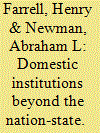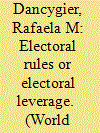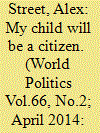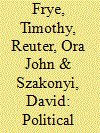|
|
|
Sort Order |
|
|
|
Items / Page
|
|
|
|
|
|
|
| Srl | Item |
| 1 |
ID:
129992


|
|
|
|
|
| Publication |
2014.
|
| Summary/Abstract |
What is the relationship between domestic and international politics in a world of economic interdependence? This article discusses and organizes an emerging body of scholarship, which the authors label the new interdependence approach, addressing how transnational interactions shape domestic institutions and global politics in a world of economic interdependence. This literature makes three important contributions. First, it examines how domestic institutions affect the ability of political actors to construct the rules and norms governing interdependent relations and thus present a source of asymmetric power. Second, it explores how interdependence alters domestic political institutions through processes of diffusion, transgovernmental coordination, and extraterritorial application and in turn how it changes the national institutions mediating internal debates on globalization. Third, it studies the shifting boundaries of political contestation through which substate actors affect decision making in foreign jurisdictions. Given the importance of institutional change to the new interdependence agenda, the authors suggest several instances where historical institutionalist tools might be exploited to address these transnational dynamics, in particular, mechanisms of cross-national sequencing and change strategies of substate actors. As globalization continues, it will be ever more difficult to examine national trajectories of institutional change in isolation from each other. Equally, it will be difficult to understand international institutions without paying attention to the ways in which they both transform and are transformed by domestic institutional politics. While the new interdependence approach does not yet cohere as a single voice, the authors believe that it offers an innovative agenda that holds tremendous promise for both comparative and international relations research as it calls on scholars to reconsider the dynamic nature of globalization for global politics.
|
|
|
|
|
|
|
|
|
|
|
|
|
|
|
|
| 2 |
ID:
129989


|
|
|
|
|
| Publication |
2014.
|
| Summary/Abstract |
Immigration has fundamentally altered the ethnic and religious makeup of most advanced democracies, but substantial variation is observed in the political representation of immigrant-origin minority groups across countries and cities. Though existing research has highlighted the role of electoral institutions in explaining minority representation, it is often difficult to isolate their effects across contexts. Focusing on Muslims in England and employing a new data set containing over 42,000 candidate-level observations, this article explains Muslim candidate election and selection. To do this, the author makes use of a rule change whereby a subset of localities switched from the use of multimember elections to the use of single-member elections. She finds that these electoral rules have no significant effect on the share of Muslims that gets elected but that they do influence the selection process: in a given election, Muslims are half as likely to be selected when only one seat is up for election as compared with when three seats are in play. Yet parties balance the slate across consecutive single-member elections, leading to similar results across systems. Further, the more undesirable the seat, the more likely it is to have a Muslim on the ticket, but this effect holds only in single-member elections, and it reverses as Muslims gain electoral leverage. Overall electoral leverage proves crucial: the effect of institutions and the potential for institution-based discrimination are conditional on the size and concentration of the local Muslim population and the votes it can deliver at both the election and the selection stages.
|
|
|
|
|
|
|
|
|
|
|
|
|
|
|
|
| 3 |
ID:
129991


|
|
|
|
|
| Publication |
2014.
|
| Summary/Abstract |
Despite allegations that foreign aid promotes corruption and patronage, little is known about how recipient governments' electoral incentives influence aid spending. This article proposes a distributional politics model of aid spending in which governments use their informational advantages over donors in order to allocate a disproportionate share of aid to electorally strategic supporters, allowing governments to translate aid into votes. To evaluate this argument, the author codes data on the spatial distribution of multilateral donor projects in Kenya from 1992 to 2010 and shows that Kenyan governments have consistently influenced the aid allocation process in favor of copartisan and coethnic voters, a bias that holds for each of Kenya's last three regimes. He confirms that aid distribution increases incumbent vote share. This evidence suggests that electoral motivations play a significant role in aid allocation and that distributional politics may help explain the gap between donor intentions and outcomes.
|
|
|
|
|
|
|
|
|
|
|
|
|
|
|
|
| 4 |
ID:
129990


|
|
|
|
|
| Publication |
2014.
|
| Summary/Abstract |
A reform of German citizenship law in 2000 was expected to greatly increase the number of foreign residents becoming German citizens. In fact, the naturalization rate fell and has remained low ever since. This outcome cannot be explained either by existing research on citizenship laws or by scholarship on individual incentives to naturalize. Instead, this article argues that the family context shapes decision making about citizenship, with distinctive behavioral implications. Parents have an incentive to naturalize and thereby extend their new citizenship status to their children. The introduction of a right to citizenship for many children born in Germany to immigrant parents removed this incentive for the parents to naturalize. The author tests the predictions of this argument against both qualitative and quantitative evidence. The article concludes with a discussion of other domains in which it may be possible to gain analytic leverage by studying political decisions in the family context.
|
|
|
|
|
|
|
|
|
|
|
|
|
|
|
|
| 5 |
ID:
129981


|
|
|
|
|
| Publication |
2014.
|
| Summary/Abstract |
The authors explore how modern autocrats win elections by inducing employers to mobilize their employees to vote for the regime and thereby subvert the electoral process. using two original surveys of employers and workers conducted around the 2011 parliamentary elections in russia, they find that just under one-quarter of employers engaged in some form of political mobilization. they then develop a simple framework for identifying which firms engage in voter mobilization and which workers are targeted for mobilization. firms that are vulnerable to state pressure-financially dependent firms and those in sectors characterized by asset immobility-are among the most common sites of workplace-based electoral subversion. the authors also find that workers who are especially dependent on their employer are more likely to be targeted for mobilization. By identifying the conditions under which workplace mobilization occurs in authoritarian regimes, the authors contribute to the long-standing debate about the economic bases of democratization. in addition, they explore an understudied means of subverting elections in contemporary autocracies: the use of economic coercion to mobilize voters. Moreover, their research finds that clientelist exchange can thrive in industrial settings and in the absence of deeply embedded political parties.
|
|
|
|
|
|
|
|
|
|
|
|
|
|
|
|
|
|
|
|
|